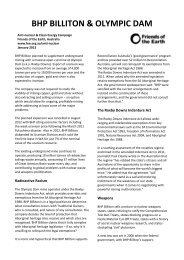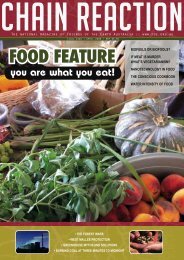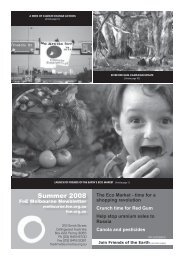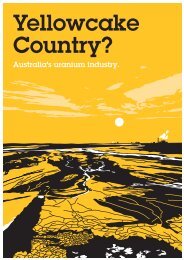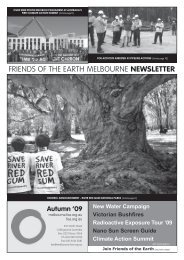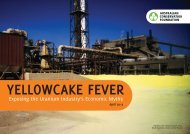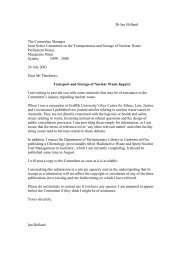Thirty Years of Creative Resistance - Friends of the Earth Australia
Thirty Years of Creative Resistance - Friends of the Earth Australia
Thirty Years of Creative Resistance - Friends of the Earth Australia
You also want an ePaper? Increase the reach of your titles
YUMPU automatically turns print PDFs into web optimized ePapers that Google loves.
In 2003, <strong>the</strong>y became <strong>the</strong> first large land<br />
manager to gain independent certification<br />
<strong>of</strong> forestry operations in <strong>Australia</strong> through<br />
<strong>the</strong> Forest Stewardship Council (FSC).<br />
FoEM continues to monitor this process<br />
and <strong>the</strong> broader timber trade.<br />
In <strong>the</strong> first few years <strong>of</strong> <strong>the</strong> 1990s, FoE<br />
also started working on arid zone issues<br />
in a new way, with a stronger emphasise<br />
on land management ra<strong>the</strong>r than just<br />
localised impacts, largely at <strong>the</strong> instigation<br />
<strong>of</strong> Stephen Baker in Adelaide and Clive<br />
Rosewarne in Melbourne. The January<br />
1993 FoE national meeting proposed <strong>the</strong><br />
creation <strong>of</strong> a national arid lands coalition,<br />
which planned to help co-ordinate<br />
campaigning on <strong>the</strong> management <strong>of</strong><br />
<strong>Australia</strong>’s extensive arid zone rangelands<br />
and <strong>the</strong> Lake Eyre Basin.<br />
The years under <strong>the</strong> Victorian Kennett<br />
State Government (1992-99) marked a<br />
time <strong>of</strong> significant community politicisation<br />
and unprecedented resistance at <strong>the</strong><br />
grassroots level in Melbourne and across<br />
<strong>the</strong> state. In <strong>the</strong> early days, much <strong>of</strong> <strong>the</strong><br />
community sector was overwhelmed at<br />
<strong>the</strong> sheer number <strong>of</strong> destructive social<br />
and environmental projects put forward<br />
by <strong>the</strong> Government. There were a series<br />
<strong>of</strong> remarkable ‘general strikes’, but <strong>the</strong>se<br />
dissipated after <strong>the</strong> key organisers <strong>of</strong><br />
<strong>the</strong>se rallies, <strong>the</strong> leadership <strong>of</strong> Trades Hall,<br />
wavered.<br />
In <strong>the</strong> next few years, what started as a<br />
variety <strong>of</strong> local campaigns against specific<br />
government projects, cut backs to services<br />
or policy decisions, increasingly merged<br />
into a broad-based and well connected<br />
movement. Campaigns were everywhere,<br />
from opposition to <strong>the</strong> siting <strong>of</strong> <strong>the</strong> Grand<br />
Prix car race in a public space at Albert<br />
Park, to <strong>the</strong> successful struggles against<br />
<strong>the</strong> proposed hazardous waste facilities at<br />
Niddrie and Werribee, and <strong>the</strong> occupations<br />
<strong>of</strong> Northlands and Richmond secondary<br />
colleges after <strong>the</strong>y were ‘rationalised’ by<br />
<strong>the</strong> government.<br />
FoEM played a significant role in many<br />
struggles, both in terms <strong>of</strong> physical<br />
involvement <strong>of</strong> staff and members in picket<br />
...................................................................................................................................................................................................<br />
lines and campaigns, and also in behind<br />
<strong>the</strong> scenes training in non violent action,<br />
police liaison, facilitation skills and o<strong>the</strong>r<br />
aspects <strong>of</strong> community organising.<br />
FoEM produced <strong>the</strong> booklet Environmental<br />
Justice: Community Campaigning in<br />
<strong>Australia</strong> in 1999 as a contribution to<br />
<strong>the</strong> development <strong>of</strong> this new stage in<br />
<strong>Australia</strong>n environmental politics.<br />
In 1994, FoEM acted as a focal point for<br />
community opposition to <strong>the</strong> extension<br />
<strong>of</strong> <strong>the</strong> eastern Freeway into <strong>the</strong> inner<br />
nor<strong>the</strong>rn suburbs <strong>of</strong> Melbourne. The<br />
Coalition Against Freeway Extensions<br />
(CAFÉ), consciously named to honour <strong>the</strong><br />
earlier CAF – Citizens Against Freeways<br />
struggle <strong>of</strong> 1977, was formed after a<br />
transport seminar organised by FoEM and<br />
Greenpeace and drew toge<strong>the</strong>r a range <strong>of</strong><br />
individuals, students and public transport<br />
and local residents’ organisations.<br />
CAFE activists blockaded road making<br />
operations on Alexandra Parade for over<br />
FoE 30 <strong>Years</strong> 57



